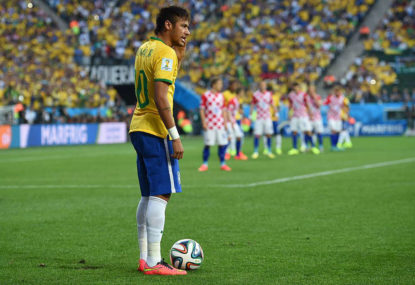As we reflect on an outstanding and even opening two rounds of the World Cup, there is one question that keeps repeating on me: Can the hosts do what Les Bleus did in 1998 by winning a home World Cup without a world class number nine?
Many long time followers of the World Cup will remember that French side coached by Aime Jacquet and how they went through the entire tournament without the requisite quality from their strikers.
His main striker was the far from impressive Stephane Guivarc’h, who went through the entire tournament without a goal.
His back-up at number nine was Christophe Dugarry, who was equally ineffective, while the third choice striker, teenager David Trezeguet, did well with his limited opportunities but was deemed too young to shoulder the main burden.
Such was the lack of output from the two main number nines, Guivarc’h and Dugarry, that it was often left to the young right-sided winger Thierry Henry and the excellent creative midfielders Zinedine Zidane and Youri Djorkaeff, to produce France’s quality in the front third.
Indeed, you may remember the distinct lack of goals from the French front men in the knock-out stages.
Instead, Laurent Blanc had to come to the rescue in extra time in the second round against Paraguay, penalties were required after a quarter-final scoreless draw with Italy, and right back Lilian Thuram scored a brace in the semi-final win over Croatia.
France’s ultimate success was built more on the depth of their squad and ability to control opponents through their solid defensive structure, and then rely on the magic of Zidane and Djorkaeff.
As we look at Brazil, the hosts 16 years on, there are similarities in that Luiz Felipe Scolari has hitherto struggled to get any quality out of his main number nines, starter Fred and back-up Jo.
While the work behind them hasn’t been as controlled as that of the likes of Didier Deschamps, Marcel Desailly, Patrick Viera and Emmanuel Petit in 1998, there have still been signs the team has enough quality to keep progressing.
In the opener against Croatia it was Neymar who shined. In the second game, against Mexico, it was Oscar, moved to the right after an ineffective opener at number 10. Against Cameroon, Neymar was back to his best.
In the dramatic second round penalties win over Chile it was Hulk who stood out.
So far Brazil have been sharing the creative burden around, and the three behind Fred have yet to all click in the same match.
Elsewhere Luis Gustavo has been doing a great job screening the defence, but has yet to find a reliable partner between Paulinho, Fernandinho and Willian. I’ve been surprised Felipao hasn’t given more opportunities to Hernanes.
In any case, the manager will now need to find two solutions in the midfield with Gustavo suspended for Saturday’s quarter-final against the impressive Colombia.
You can see, therefore, that Fred isn’t the only headache for Scolari.
As well, he has to contend with an organised Colombia brilliantly coached by Jose Peckerman and flowing at the feet of the prodigious James Rodriguez.
Like so much of this World Cup, it’s a fascinating mix, and totally unpredictable, yet the evidence of the first knock-out phase is that the favourites, or the established powers, just find a way of getting the job done.
Brazil certainly showed in the first half of the pulsating cash with Chile that they can rise, and in the second half they showed their vulnerability, Jorge Sampoali overloading the midfield and complicating this for the hosts.
It’s been the way of the tournament and the reality is there is no one team standing out and looking the total package.
To highlight a few issues, Germany have them at the back and haven’t found the right mix elsewhere, Argentina are heavily reliant on Lionel Messi and struggling to unlock deep-sitters, and the Dutch need Arjen Robben to continue his great form.
Perhaps the most impressive in defence have been the three teams aiming for a first world title, the Netherlands, Belgium and Colombia, and one-time winners France.
But history and tradition live with the likes of Brazil, Argentina and Germany, and even if they have a number of weaknesses, including the lack of output at nine, they remain a better than even chance of going all the way.
Just as Les Bleus showed all those years ago, it’s not impossible to win a Word Cup without a high quality finisher at the head of the formation.
Indeed, Brazil aren’t the only team left struggling to get goals from their number nines. You only have to look at Argentina and Gonzalo Higuain.
More so, it’s been a tactical trend over the past five or so years to move away from having traditional strikers and relying on a bevy of more mobile creative front third floaters.
It’s true the Selecao’s two most recent World Cup winning sides relied on traditional front-men (Romario and Bebeto in 1994 and Ronaldo in 2002), but it’s not inconceivable that Neymar, Oscar and Hulk, if they can find better chemistry, could do the business here.





























































































